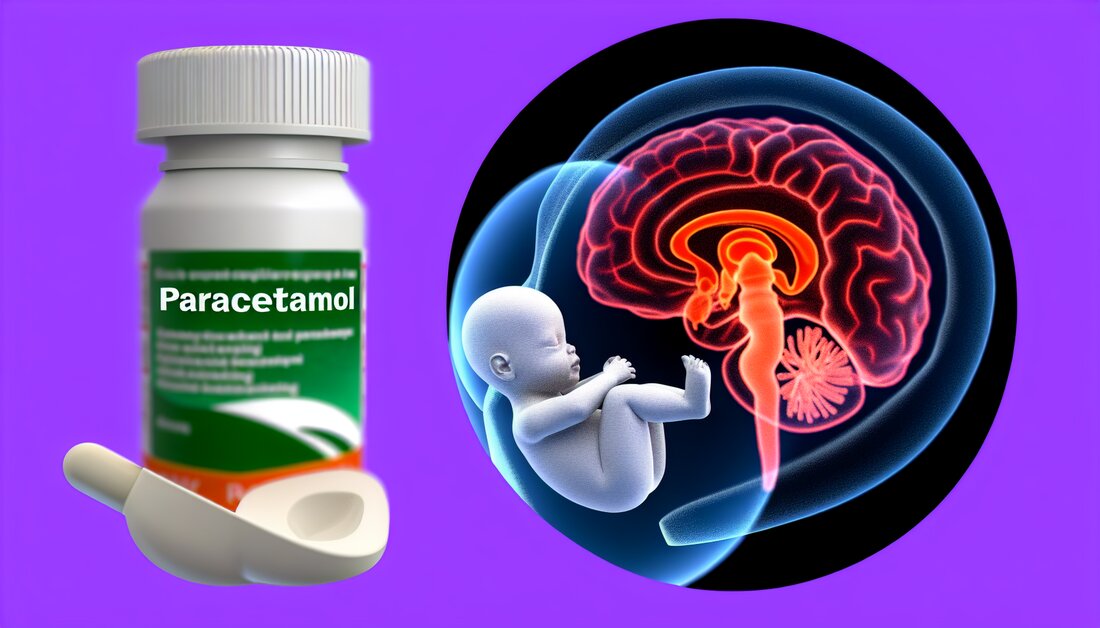Paracetamol in the womb: Impaired auditory processing reveals risks for brain development
New study shows that high doses of paracetamol during pregnancy can lead to auditory processing disorders in offspring. Possible early indicator of neurodevelopmental disorders!

Paracetamol in the womb: Impaired auditory processing reveals risks for brain development
Paracetamol, a commonly used pain and fever reliever, is considered one of the safest medications to take during pregnancy. But new studies raise questions about the possible effects of paracetamol on the unborn child. Scientists have found that paracetamol and its breakdown products can reach the fetus and also cross the blood-brain barrier. Recent, extensive research suggests that taking acetaminophen during pregnancy may increase the risk of neurodevelopmental disorders such as autism spectrum disorder (ASD), attention deficit hyperactivity disorder (ADHD), and developmental delays (DD).
Because auditory impairment is a common feature of ASD, it was hypothesized that animals exposed to acetaminophen in utero would exhibit impaired brainstem function in the area of hearing. This assumption was examined in young rats, closely tracking changes in their auditory perception after high doses of paracetamol. It was found that the animals' body or brain weight was not affected, but the opening of the ears was delayed and higher hearing thresholds occurred. Delays in the measured brain responses to acoustic stimuli were also observed.
Possible future developments
These results indicate that high-dose acetaminophen intake during pregnancy may affect the development and function of the auditory brainstem. This finding could help establish simple, non-invasive hearing tests as early detection tools for neurodevelopmental disorders. If further studies confirm these results, this could lead to adjustments in medical practice to be more careful with paracetamol administration during pregnancy.
Basic terms and concepts
- Paracetamol: Ein weit verbreitetes Medikament zur Behandlung von Schmerzen und Fieber.
- Analgesisch und Antipyretisch: Bezieht sich auf die Schmerzlinderung (analgetisch) und die Fiebersenkung (antipyretisch) von Medikamenten.
- Autismus-Spektrum-Störung (ASD): Eine Entwicklungsstörung, die unterschiedliche Fähigkeiten in sozialen Interaktionen und Kommunikation umfasst.
- Aufmerksamkeitsdefizit-Hyperaktivitätsstörung (ADHS): Eine neurologische Störung, die durch anhaltende Unaufmerksamkeit, Hyperaktivität und Impulsivität gekennzeichnet ist.
- Entwicklungsverzögerungen (DD): Verzögerungen in der Erreichung von Entwicklungsmeilensteinen im Vergleich zu Gleichaltrigen.
- Hirnstamm und akustische Signale: Der Hirnstamm ist ein Teil des Gehirns, der wesentliche Funktionen steuert, darunter Reaktionen auf akustische Reize.
Abbreviations
- ASD – Autismus-Spektrum-Störung
- ADHS – Aufmerksamkeitsdefizit-Hyperaktivitätsstörung
- DD – Entwicklungsverzögerung
- ABR – Auditorisch evozierte Hirnstammantwort
Influence of paracetamol on auditory brainstem development
The present study addresses the effects of intrauterine exposure to paracetamol on neurophysiological development, particularly in the auditory brainstem area. Paracetamol, known as a safe pain and fever-reducing drug during pregnancy, and its metabolites can cross the placental barrier and pass the blood-brain barrier. Recent large epidemiological studies suggest that exposure to acetaminophen in utero may increase the risk of neurodevelopmental disorders such as autism spectrum disorder (ASD), attention-deficit/hyperactivity disorder (ADHD), and developmental delays (DD).
Experimental method and results
The research team examined the hypothesis that animals exposed to acetaminophen in utero would exhibit impairments in auditory brainstem function. To investigate this hypothesis, click-induced auditory brainstem responses (ABR) were recorded and analyzed in Sprague-Dawley rats on postnatal days 21 and 29.
- Die Exposition in utero gegenüber hohen Dosen von Paracetamol hatten keinen Einfluss auf das Körper- oder Gehirngewicht der Ratten.
- Es wurde jedoch eine signifikante Verzögerung der Ohrenöffnung beobachtet.
- Die Tiere zeigten erhöhte ABR-Schwellen und verlängerte Wellen- und Interwellenlatenzen.
- Diese Latenzverlängerungen waren bei der höchsten getesteten Klickintensität vorhanden, aber am stärksten in der Nähe der Schwelle ausgeprägt.
Assessment and implications
The results suggest that auditory brainstem development and function may be affected by high dose acetaminophen exposure. This may suggest that simple, non-invasive tests of auditory function may be useful as an early screening tool for neurodevelopmental disorders. The study highlights the need for further research to clarify the mechanisms by which acetaminophen may affect neurological development.
The findings of this study highlight the caution in using acetaminophen during pregnancy and suggest that the potential effects on neuronal development, particularly at high levels of exposure, should be further investigated.
For further details and further information, please refer to the original publication: https://pubmed.ncbi.nlm.nih.gov/39550993

 Suche
Suche
 Mein Konto
Mein Konto
